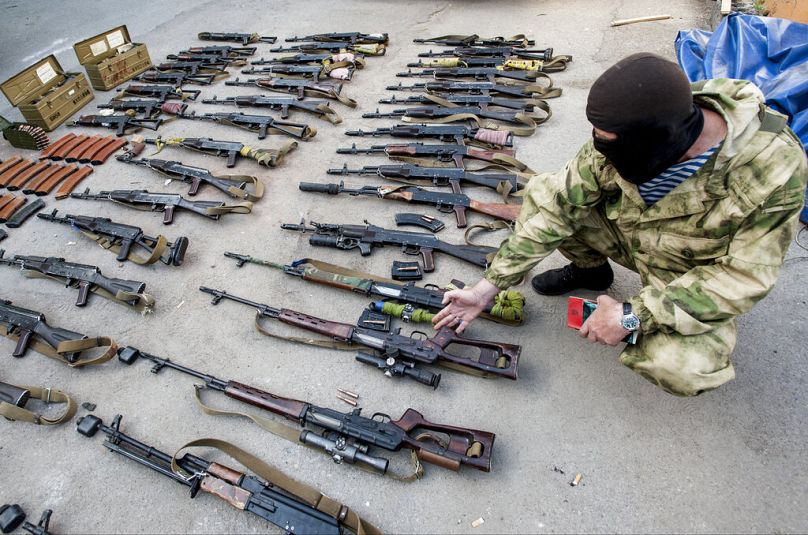With UK arms supplies to Ukraine soaring, the CAAT raised concerns about waste, corruption and where weapons end up after the conflict.
UK arms exports nearly doubled in 2022 to £8.5bn (€9.8bn), according to a new report by the Campaign Against Arms Trade (CAAT).
 ADVERTISEMENT
ADVERTISEMENT
 ADVERTISEMENT
ADVERTISEMENT
It revealed the UK - historically one of the world's largest weapons makers - issued the highest-ever value of arms export licences since records began.
The findings come amid an upsurge in violence and bloodshed around the world, with the number of people killed in conflict reaching a 28-year high in 2022.
This trend is largely due to wars in Ethiopia and Ukraine, with London staunchly supporting Kyiv its fight against Russia.
Writing on X, CAAT called Ukraine "a country of concern due to transparency issues," adding there were worries about the "measures in place to safeguard what happens to the weapons once the conflict ends."
Their report, published on Thursday, shows most weapons exports went to repressive regimes or those with poor human rights records, especially in the Middle East.
Qatar brought the most weapons in 2022 at £2.7bn (€3.1bn) - mostly from a deal surrounding 24 Typhoon combat aircraft - followed by Saudi Arabia's £1.1bn (€1.3bn) purchases of primarily missiles and bomb components.
Saudi Arabia has militarily intervened in Yemen's civil war since 2015, where fighting has directly and indirectly killed hundreds of thousands, says the United Nations.
Saudi-led airstrikes have been called war crimes, with London reportedly accused of providing personnel and expertise, as well as armaments, for this brutal campaign.
The next three destinations for UK weapons were the US (£860m/€995m), Turkey (£424m/€490m) and Ukraine (£401m/€463m), according to the CAAT report.
Arms gifted to Kyiv by London were not included in this figure, though they form the bulk of arms supplies to Ukraine.
"The government has made clear that they will not publish details of contracts for arms procured from overseas for Ukraine," wrote the report's authors. "The rapid nature of such procurement, combined with this lack of transparency, raises the risk of waste and corruption."
"The risk of diversion of arms, especially after the war ends, to other countries, armed groups, or criminal gangs is a major concern, especially as Ukraine has a poor history in this area," it added.
Regarding the UK's Western allies, the group noted the bulk of sales to the US were of small arms, such as sniper rifles, which it called "highly "problematic" in a press release.
"Weapons exported by the UK could contribute to gun violence, or be smuggled to Mexico and Central America where a large proportion of the guns used by criminal gangs originate from the US," it wrote.
The CAAT study revealed UK arms had been sold in "unidentified regions, presumably where the companies have not disclosed the customer."
Many UK weapons deals are made through a secretive and opaque licensing system, allowing tens of billions of missiles, bombs and machine guns to reach "sensitive locations", CAAT said in 2020.
"The UK is complicit in fuelling conflict around the world. Billions of pounds of arms are exported to dictatorial, or near-dictatorial regimes that commit appalling human rights violations with a disturbing lack of transparency," CAAT’s media coordinator Emily Apple is quoted as saying by The Canary.
The CAAT report urged the UK government to stop issuing export licences to states engaged in "serious and persistent" human rights abuses.











